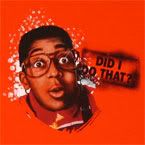
The 90s were the age of extreme. Extreme sports, extreme caffeinated beverages, and even extreme candy. That's right, extreme candy. Though it may seem counter-intuitive to assume a candy can possess daring, risk-takable qualities, the 90s made it happen. Sure, you had to endure a great deal of pain and discomfort, tooth enamel loss, and burned off taste buds...wait a minute. Where was I going with this?
Ah, yes. Extreme. The simple qualifier that made children and teenagers delight in torturing their taste buds, no questions asked. Children are a wonderfully flexible market demographic. If through marketing you can somehow manage to convince children that intentionally putting themselves in a great deal of tear-inducing pain is a means of proving themselves on the playground, then by all means do so. After all, convincing children that something is cool is a hell of a lot easier than adults, and takes far less logical explanations.
Hence was the case with Warheads. If measured on a quality scale devoid of context, these hard candies would have relatively little value. They were eye-poppingly sour, made possible by all sorts of unnatural acidic ingredients created in labs. Warheads contained very little in the way of anything found in nature. The experience of eating a Warhead in itself was not innately pleasurable. Rather, advertisers had managed to convince us that our endurance of their sour taste was in some way to scale with our general coolness reputation.

In retrospect the notion is completely ridiculous, but as children we swore by it. Playground peer pressure quickly swept the nation as kids inexplicably agreed that the ability to consume an unbearably sour candy was the hallmark of coolness. Never mind that these babies were named for a form of nuclear weaponry. Never mind that the packaging pictured a mushroom cloud erupting behind a struggling, miserable looking mascot with bulgy eyes and puckered lips. We wanted our sour candies and that was that.
Indeed, these suckers required a warning label. Though not found on original packaging, current Warhead wrappers sport the following caveat:
"Eating multiple pieces within a short time period may cause a temporary irritation to sensitive tongues and mouths."
Right. So what you're telling me is right there on the package, it indicates that this will be a horrifying unpleasurable experience certain to disrupt the normal balance of my natural mouth environment. Sounds like something I'd like to eat!
Warheads came in numerous varieties such as Mega and Atomic. In early days, the company even had the bright idea to manufacture a "hot" version of the candy. This experiment proved intensely disgusting, but remarkably did nothing to detract from the strength of the Warhead brand. You're telling me you're willing to continually put your trust in the people who arbitrarily believed that you as a child consumer would delight over "Hot Grape?" Give me a break. I've got a bottle of Dimetapp and a microwave at home, buddy. Nice try.

In the spirit of cough syrup, Warheads are now available in liquid form. There's nothing quite like eye-dropping some painfully sour substance onto your tongue, droplet by droplet. Yum!
The underlying principle behind the explosive popularity of Warheads lay largely in children's inherently competitive nature. A bitter and sour candy alone is not particularly desirable, but a bitter and sour candy that allows you to go head-to-head (well, Warhead to Warhead) with cocky classmates? Sign me up. It was peer pressure at its very finest. Warhead-eating contests became a common phenomenon, even boasting a widely-accepted list of universal rules for sour endurance.
The candies were also prime targets for absurd urban legends based on the questionably chemical candy components and tongue-burning taste. We heard rumors that children had burned off all of their taste buds or lost all sense of taste from overexposure to Warheads. You have to admit if you've ever managed to get through the sour coating of a Warhead that that seems vaguely plausible. These legends fell somewhere on the believability spectrum between pop-rocks-and-coke and sitting-too-close-to-the-tv-will-make-you-blind. It seemed possible. The idea that the mere passive act of eating a candy could be daring and dangerous and could cement your reputation was too good to pass up. Hey, I'd be willing to sacrifice a few taste buds if I could be Four Square King every day at recess. Just sayin'.

In reality, the only thing you were proving was that you were gullible enough to believe that enduring a disgusting sour coating for 30 seconds was in some way correlated to your social standing. Sure, it came with the added bonus of your overenthusiastic classmates cheering you on and the almighty title of Warhead conqueror, but it wasn't exactly a marketable skill. I have yet to go on a job interview where the boss has said, "Your resume looks great, everything seems to be in order. Oh, just one more thing--how are you with mega atomic Warheads?"
Regardless of its lack of application, this level of pain threshold was bound to make you at the very least a minor classroom celebrity. So embrace the lip-puckering sourness. It may not be particularly palatable, but it's still better than the alternative.









